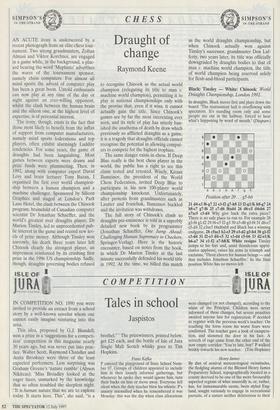SIMPSON'S IN-THE-STRAND f0j
v
CHESS
SIMPSON'S
IN-THE•STRAND
AN ACUTE irony is underscored by a recent photograph from an elite chess tour- nament. Two strong grandmasters, Zoltan Almasi and Viktor Korchnoi, are engaged in a game while, in the background, a plac- ard bearing the word `Mephisto' advertises the wares of the tournament sponsor, namely chess computers. For almost all mind sports the advent of computer play has been a great boon. Untold enthusiasts can now play at any time of the day or night against an ever-willing opponent, whilst the clash between the human brain and the silicon one, at the highest level of expertise, is of perennial interest.
The irony, though, exists in the fact that those most likely to benefit from the influx of support from computer manufacturers, namely mind sports federations and top players, often exhibit alarmingly Luddite tendencies. For some years, the game of draughts had been languishing. Most games between experts were drawn and prize funds were plummeting. Then, in 1992, along with computer expert David Levy and brain lecturer Tony Buzan, I organised the first ever world champion- ship between a human champion and a machine challenger. Sponsored by Silicon Graphics and staged at London's Park Lane Hotel, the clash between the Chinook program, brainchild of Canadian computer scientist Dr Jonathan Schaeffer, and the world's greatest ever draughts player, Dr Marion Tinsley, led to unprecedented pub- lic interest in the game and record new lev- els of prize money. Although Tinsley won narrowly, his death three years later left Chinook clearly the strongest player, an impression reinforced by its crushing first prize in the 1996 US championship. Sadly, though, draughts governing bodies refused
Draught of change
Raymond Keene
to recognise Chinook as the actual world champion (relegating its title to man v. machine world champion), permitting it to play in national championships only with the proviso that, even if it wins, it cannot actually gain the title. Since Chinook's games are by far the most interesting ever seen, and its style of play has utterly ban- ished the anathema of death by draw which previously so afflicted draughts as a game, it is a tragedy that draughts officials cannot recognise the potential in allowing comput- ers to compete for the highest trophies.
The same danger exists in chess. If Deep Blue really is the best chess player in the world, the public has a right to see this claim tested and retested. Wisely, Kirsan Ilumzinov, the president of the World Chess Federation, invited Deep Blue to participate in his new 100-player world championship knockout. Unfortunately, after protests from grandmasters such as Lautier and Ivanchuk, Ilumzinov buckled and the invitation was withdrawn.
The full story of Chinook's climb to draughts pre-eminence is told in a superbly detailed new book by its programmer (Jonathan Schaeffer, One Jump Ahead: Challenging Human Supremacy in Checkers, Springer-Verlag). Here is the historic encounter, based on notes from the book, in which Dr Marion Tinsley at the last minute successfully defended his world title in 1992. At the time, we billed this match as the world draughts championship, but when Chinook actually won against Tinsley's successor, grandmaster Don Laf- ferty, two years later, its title was officially downgraded by draughts bodies to that of man v. machine world champion, the title of world champion being reserved solely for flesh-and-blood participants.
Black: Tinsley — White: Chinook: World Draughts Championship, London 1992.
In draughts, Black moves first and plays down the board. 'The tournament hall is overflowing with spectators. It's standing room only and some people are out in the hallway, forced to hear what's happening by word of mouth.' (Diagram) Position after 20 . . . g5-h6
21 d4-e3 f6-g7 22 e3-f2 g7-h8 23 f2-gl/K h8-g7 24 b8-c7 g7-f6 25 c7-d6 f6xd4 26 d6-c5 d4xb6 27 a7xc5 c3-d4 Why give back the extra piece? There is no safe place to run to. For example 28 g3-f4 gl-f2 29 f4-e5 f2-g3 30 e5-d6 g3-f4 31 d6-c7 c5-d4 32 c3xe5 f4xd6xb8 and Black has a winning endgame. 28 c5xe3 b2-c3 29 e3-d2 g3-h4 30 gl-f2 c3-d4 31 f2-e3 d4-c5 32 e3-d4 c5-66 33 d2-el/K b6-a7 34 el-f2 a7-b8/K White resigns Tinsley jumps to his feet and, amid thunderous appre- ciative applause, raises his arms in triumph and exclaims, 'Three cheers for human beings — and that includes Jonathan Schaeffer.' In the final position White has no moves left.


























































 Previous page
Previous page